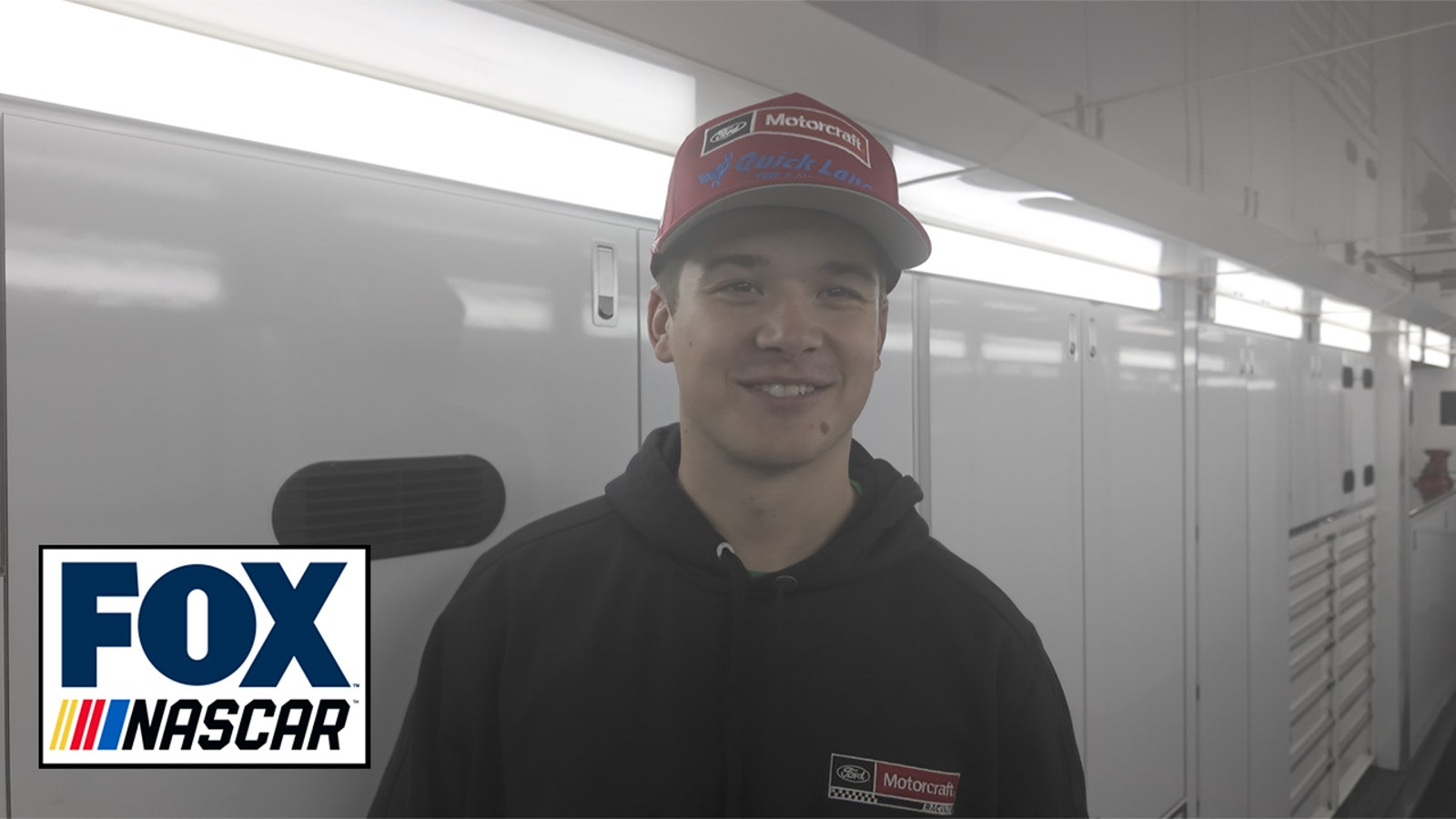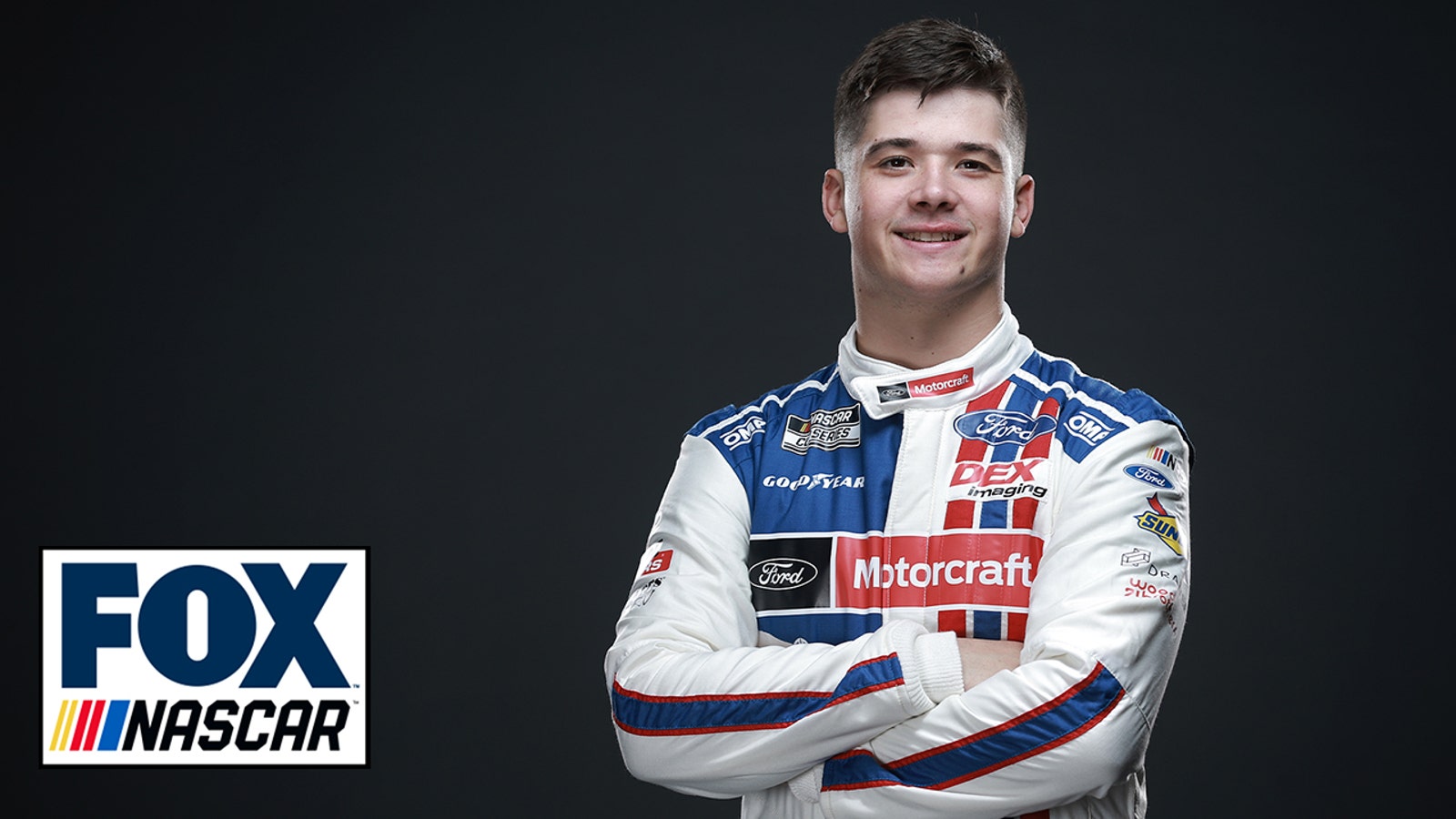Bob Pockrass
FOX NASCAR Insider
As NASCAR begins a swing through Virginia at Richmond and Martinsville, it is startling to realize that there is only one NASCAR Cup Series driver (Denny Hamlin) from Virginia.
But there is one other Cup driver who is close to claiming Virginia as home. Harrison Burton’s father, Jeff, and family have roots in Virginia. And his Wood Brothers Racing team is synonymous with Virginia with its former shop (now a museum) still just 28 miles from Martinsville.
So this seemed to be a good time to catch up with Burton. The 23-year-old driver won the 2017 ARCA East title at age 17 and four Xfinity races in 2020. But his Cup career has been a struggle driving for Team Penske affiliate Wood Brothers. He has just one top-5 and four top-10s in 79 career starts. He sits 32nd in the Cup standings.
Burton talks about his approach this year as he fights to show he can race with the sport’s best, some of it coming from advice of his father — Jeff Burton, now an analyst for NBC Sports, who ranks tied for 39th all-time with 21 career Cup wins.
Going to Richmond and Martinsville, do those tracks mean any more to you either because of your family ties or the Wood Brothers ties to the state?
Definitely to both. For me, Martinsville is probably 50 minutes from where my whole family is from in South Boston. My grandparents always come and I get to see them and enjoy that. And obviously, [my cousin] Jeb, is racing the Xfinity race now there, which is really cool. Whenever we’re both at the same racetrack, or in Virginia, is really neat. Richmond is a little different to me because it’s a little further away from South Boston. But the cool thing is it was my dad’s favorite racetrack. I always feel like I’ve got to go run well there or my dad’s going to start giving me pointers. We’ve got to avoid that as much as possible.
Speaking of your dad giving you pointers, how much does your dad give you pointers? And how much does he try to stay away from giving you pointers these days?
He does a little both. There’s times when he’s very useful, and with his racing IQ — he’s been around for so long, he’s seen it all, he’s done it all. If I didn’t use him as a resource in my racing career, I’d be dumb. But also on another hand, I have to find out things for myself. I have to do things for myself. And the way we race and the things we do now is very different from when he was around. So he likes to look at it from a mindset point of view and kind of from a 30,000-foot view of decision-making, things like that. At Bristol, he watched my whole race from the onboard camera that NASCAR has, so he was telling me about all these moments. I’m like how do you know what happened? And he was watching. He pays attention for sure. But he tries and looks at it from a broad perspective.
Do any drivers ever blame you for things he says on TV?
No, not on TV. At least, I haven’t gotten that one yet. Thankfully, he doesn’t talk about me on TV, either, so I don’t get people saying I get the preferential talk. Still one of my favorite stories to tell — and I tell it in so many interviews that people have probably heard it, — but I won the Texas Xfinity race and the first thing he said was he felt bad for Noah Gragson. And so it’s funny how he tries to play the non-biased role. And I go on Twitter, or X now, and people are like, “Oh, you know, you can be like, positive towards your kid.” It’s a funny dynamic. When FOX is around for the first half, he’s different. He’s dad. And then the second half, he’s a reporter.
What Harrison Burton had to say about his father, Jeff Burton

Martinsville is a place where you did win — that was your last win. So what is it about that track that you feel maybe fits your style and what do you remember about that win?
One of the coolest things was my dad came over the radio. He was doing the broadcast, and they have access to the driver radio. He hadn’t done that before. But I guess they got the idea to do that for that one. I was talking to my dad on the radio while I was doing my burnout on TV. So that was kind of cool. And speaking of Martinsville, it’s just a short track and me growing up racing super late models all throughout the Southeast, I grew up short-track racing like a lot of guys did. I just feel really comfortable in that and feel like I can be one of the best in that kind of realm. I just feel confident there. There’s not a lot of questions I have going to Martinsville whereas some places, like COTA for example, I still am making decisions on where I want to run for qualifying and in practice. But Martinsville for me is very straightforward. I know what I need from the car. I can just go attack that weekend kind of freely. There’s some weekends where I don’t quite feel that confident yet. I just need those reps at certain racetracks.
How would you characterize the first five races of the year (this interview was done before the COTA race)?
It’s been interesting. We were kind of up and down and up and down starting with the duels. We ran well, had a chance to win the duel, and it didn’t go our way. Daytona 500, we wrecked on Lap 6. We went to Atlanta and ran well all day and then Vegas and Phoenix were not good. But Bristol, we showed up and felt like we’ve got to reset and we were fast in practice and qualified well. We were going forward at the beginning of the race and I think I was the first guy to find out that we were going to cord right front tires that day. So I went two laps down, got those laps back and running well and then corded another right front tire. It was like, “Oh my gosh.” But Bristol was exciting because we showed a lot of speed. We were fastest in our practice. And those things start to build confidence for our whole team.
Harrison Burton has struggled in his two-plus seasons in Cup and talks his new approach

Just how do you keep confidence, how do you get through what’s been maybe a rough couple of years?
It’s hard. You have to kind of remind yourself sometimes of what you’re capable of. And I know that when I’m at my best, I can be one of the best in the world at this. I just have to really find that form. And there’s been times I’ve found it — there’s been times where I feel amazingly confident in a Cup car. There’s been times where I haven’t, and understanding why and how is a big thing. A lot of it is, honestly, when I got to Cup, I got to where I had all this information, and I was kind of frozen by wanting to prepare. I overcomplicated things. I was thinking too much in the car. And all I heard is, “You have to prepare and work harder and find a way to beat these guys.” And I was just drowning myself in that. And now I kind of realize I just need to drive fast and understand what that means and the commitment that means and solve that problem and then the rest will follow. So simplifying has been helping me recently, and I think that will start to show signs of improvement and feel good about it.
In other words, use your instincts and then use the data once you can kind of know what your instincts are telling you?
Exactly. This is something my dad and I talked about this offseason is — talk about mindset 30,000-foot view stuff earlier — he said, “Hey, man, racing is not engineering. It’s an art. When you’re driving a race car at the limit, it’s an art form.” You have to just go attack. You get frozen in trying to perfect all these little movements with your hands and feet and you’re thinking about the wrong things — just go attack. That’s kind of been our mindset of late and I think it’ll pay dividends.
We talked about your family roots in Virginia, but the Wood Brothers obviously have roots in Virginia. What do you notice anything different, especially in Martinsville and racing for them?
A lot of Wood Brothers t-shirts. And I get cheered at driver intros. Normally, it’s kind of crickets for me, I don’t get booed or cheered — it’s like we don’t hate him, but he’s around. The crowd goes mild for me normally. But Martinsville, it gets pretty loud, which is really cool. And what’s also cool is it feels like it’s not about me. It’s always really cool when people are like, “Oh, I’m a fan of yours.” But when they’re a fan of the team that you race for, it’s kind of a different dynamic. And I have both of those and a lot of people that are just fans of the Wood Brothers car. And I agree. It’s almost something I can relate to. If I see someone that’s like, “Well, I’m a fan of you, Harrison,” … it’s kind of awkward. But if you’re a Wood Brothers fan? I was Wood Brothers fan. I grew up watching the 21 team. It’s just such a cool team. … I can relate to them more on that, which is pretty cool.
I know improvement is baby steps. But what would it mean if a chance comes to get win No. 100 for them (they have 99 Cup wins in team history)?
Yeah, obviously that’s their goal. We have a group capable of doing it. [Crew chief] Jeremy [Bullins] was on the car when Ryan [Blaney] won [No.] 99 for them. He understands what it’s like to kind of climb and build and get over that hump. We’ve been showing signs of life here recently that we can be competitive enough to do that. That first run at Bristol, going up and passing up through guys that are Cup champions. Obviously, that race ended horribly for us, but those signs are starting to come. And so to get 100 would be, it’d be unreal. Especially, it would be more special because of all the hardships we’ve been through and to overcome that would be really special.
Bob Pockrass covers NASCAR for FOX Sports. He has spent decades covering motorsports, including over 30 Daytona 500s, with stints at ESPN, Sporting News, NASCAR Scene magazine and The (Daytona Beach) News-Journal. Follow him on Twitter @bobpockrass.

Get more from NASCAR Cup Series Follow your favorites to get information about games, news and more